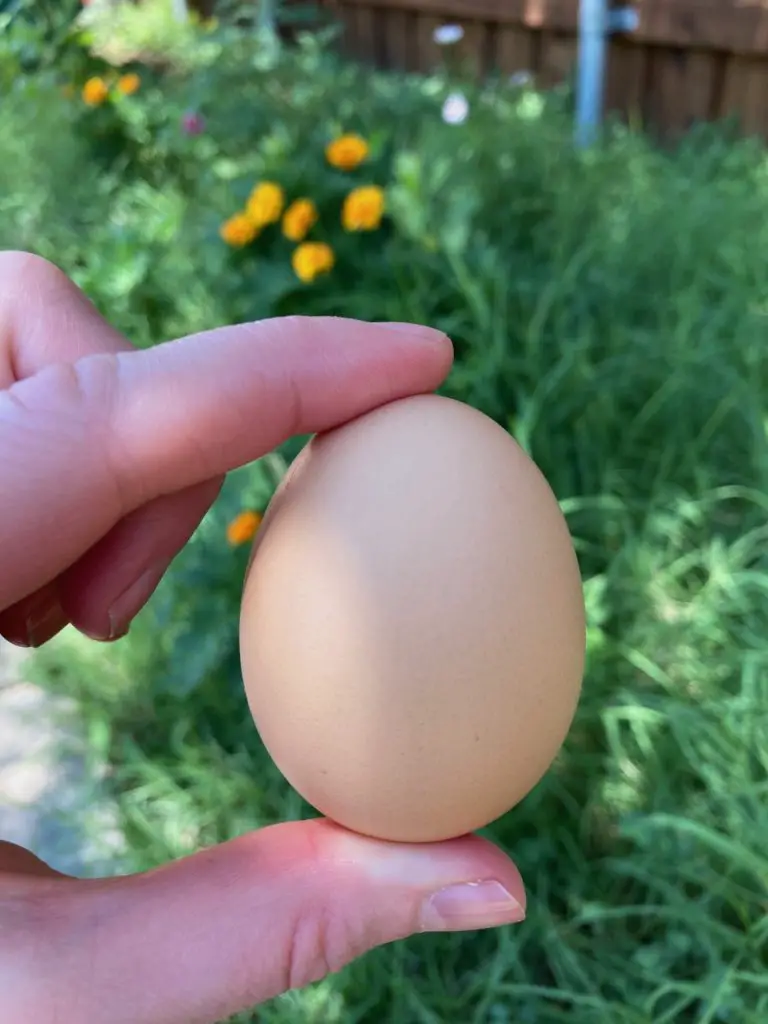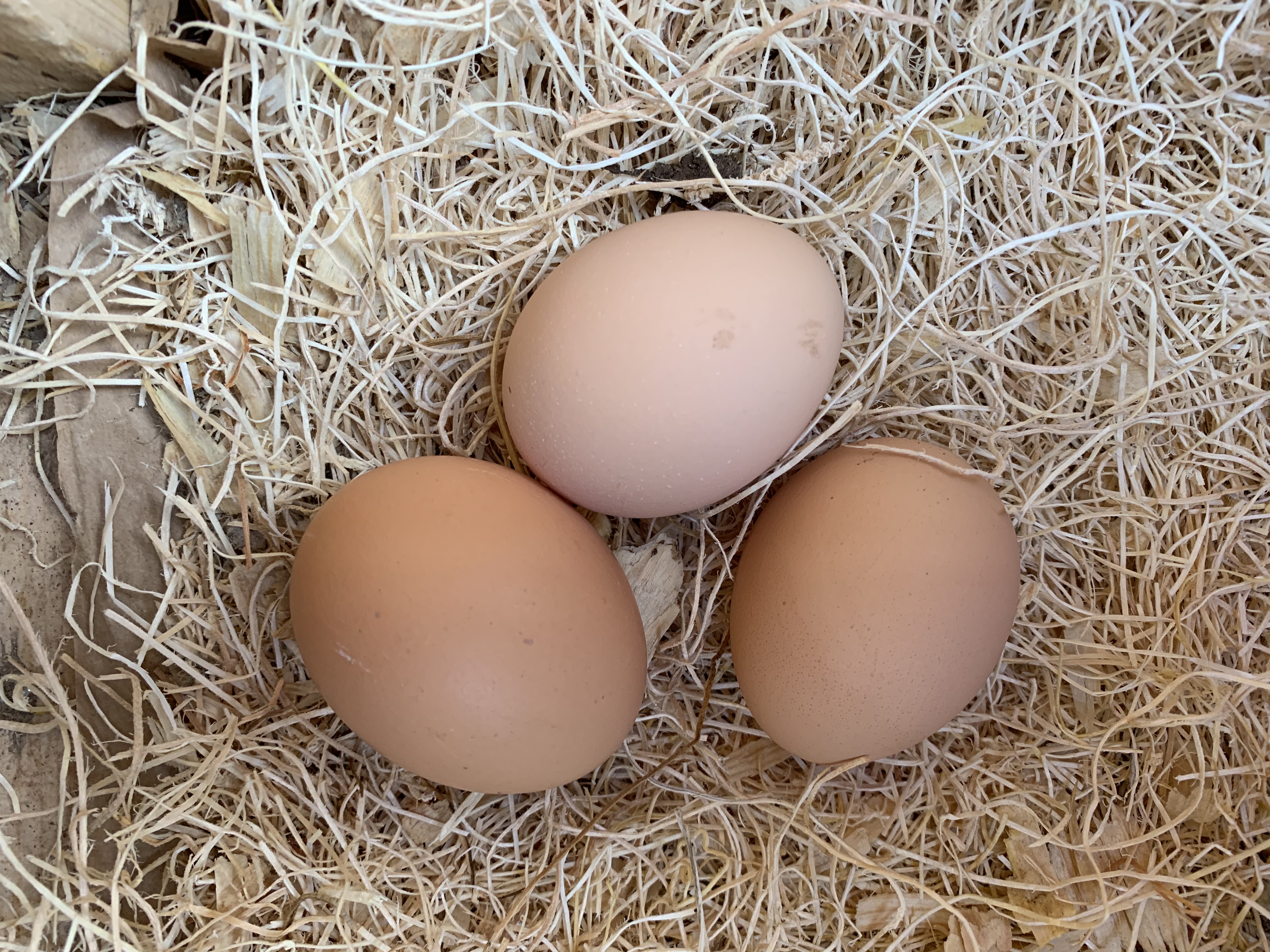Since I started raising chickens in my backyard I have heard some pretty wild things that people think about chickens. There are many misconceptions about chickens, but this post will focus only on those surrounding chicken eggs.
Myth #1: A rooster is needed for eggs
A common question is whether a hen needs a rooster in order to lay eggs. When I first told people that I was getting chickens, some people asked whether I was allowed to have a rooster in my neighborhood. I looked at them very confused because I didn’t know where they were going with this question. I eventually realized they thought I needed a rooster for my chickens to lay eggs.
Truth: A rooster is not needed for a hen to lay eggs. A hen can lay eggs with or without a rooster. The process of egg laying is due to ovulation and a rooster does not need to be included for this process to occur. A rooster is needed, however, if you would like your chickens to lay fertile eggs that can be hatched into chicks.
A hen ovulates once every 25 hours. After the yolk is released during ovulation, it will travel to the oviduct. If a rooster inseminated the hen in the 3 to 4 weeks prior to ovulation, the yolk can become fertilized. If no sperm is present, the yolk will continue its journey through the oviduct. The egg will continue through the reproductive tract of the hen, receiving the egg white and shell along the way, before it is finally laid.
Check out How Many Eggs Can a Chicken Lay in One Day to learn more about the egg laying cycle and how it’s impacted by sunlight.
Myth #2: All chickens can lay eggs
This is probably a more common misconception with children, but there are some adults that actually think that all chickens can lay eggs.
Truth: Only female chickens, called hens, can lay eggs. Male chickens, called roosters, are not capable of laying eggs.
Smaller breed hens start laying eggs about 18 to 22 weeks of age, with larger breeds taking as long as 24 to 26 weeks of age.
How Many Eggs is a Chicken Born With explains more about the age when chickens start laying eggs and how their egg laying slows down as they get older.
Myth #3: Eggs from backyard chickens contain blood and tissue
I was told by a (presumably well-meaning) in-law that our chickens would lay eggs that would contain “blood and tissue and be unfit for humans to eat.” What?!
Truth: Eggs from backyard chickens contain a yolk and egg white, the same components of an egg bought from the store.

Myth #4: All eggs need to be candled
When I started selling eggs to my co-workers, one lady asked if I was candling all the eggs that I was selling. Once again, that confused look drifted over my face and I was taken off guard by another odd question. She then told me that her grandmother would candle the eggs to make sure none of the ones they were going to eat had a baby chick inside.
Truth: Many people who raise backyard chickens only have hens; therefore, the eggs will not contain baby chicks. Candling is the process to view fertile eggs and is not necessary for eggs laid when there is no rooster who could have fertilized the hen.
Candling can also be done to determine freshness of an egg. When an egg is candled, it’s placed in front of a bright light to view the yolk inside. If the yolk is fuzzy, then it is a fresh egg. If the yolk is clearly seen and moves around inside the shell, the egg is older.
Myth #5: Eggs are soft when they are laid
I actually came across this question on the internet and it actually makes me nervous that some people are so far removed from their food supply that they would ask this question.
Truth: Eggs are laid hard, unless there is a nutritional issue with the chicken.
Eggs have a hard shell when they are laid and will not harden as they are exposed to air. Eggs are formed inside the chicken over the course of 25 hours and will not continue to develop after they are laid.
If an egg is laid with a soft shell, this could be a sign of calcium deficiency in the chicken.
Eggshells are made of calcium carbonate. Typically, hens will get sufficient calcium from their diet, especially when they are fed a layer feed. However, if the hen is not able to obtain enough calcium from her diet, her bones will be robbed of calcium to provide for the egg shell.
In Are Eggs Soft When They Are Laid, I provide more information on this topic, including how age and the weather impacts the likelihood of your chickens laying soft eggs.
Myth #6: Brown eggs taste better than white eggs
I can’t tell you the number of times I’ve heard people say they prefer brown eggs because they taste better than white eggs. Some people even claim that other colored eggs have a better taste too, like blue or green eggs.
Truth: Eggshell color has no impact on the flavor or taste of the egg. An egg is formed starting with the yolk being released from a hen’s ovary. The yolk travels through the hen’s reproductive tract to have egg white applied, followed by two membranes. The shell is then applied, along with any coloring or pigment, and the bloom is added right before the egg is laid.
The color of the shell is one of the last things added to an egg and will not have any impact on the taste. The flavor of an egg is impacted by what the chicken eats. For example, if a chicken eats excessive amounts of garlic, onions, or fish oil, their eggs might have a slightly off flavor.
Myth #7: It’s unsanitary to not refrigerate eggs
This myth is a bit of a loaded comment and depends on whether the eggs have already been refrigerated and if they have been washed.
Truth: Fresh eggs that have not been previously refrigerated or washed do not need to be refrigerated. In fact, most of the eggs my husband and I eat have not been refrigerated or washed.
When eggs are laid, they are clean and only get dirty from being in the nesting box. You don’t want to wash fresh eggs because it removes the bloom, a clear protective layer that keeps germs out of the egg. Eggshells have tens of thousands of tiny pores and when the bloom is removed, microbes are able to enter the egg.
In To Wash or Not to Wash Eggs, I explain the instances where fresh eggs should be washed and the times when it’s not necessary.

Myth #8: I buy cage-free/free-range eggs from the store and these are the same as your backyard chickens’ eggs
I have had one person suggest to me that buying cage-free or free-range eggs from the store are healthier than the generic eggs that have no special labeling and are probably the same as the eggs from my backyard chickens. No!!!!
Truth: Eggs from the grocery store that are labeled “cage-free,” “free-range,” or “pasture raised” just mean that the chickens have been allowed access to the outdoors for an undermined amount of time. This does not mean they are able to frolic in grass or have room to dust bathe and run fly.
In reality, these chickens are raised specifically for producing eggs and after they reach peak production, generally around 2 years of age, they are culled. Many times these factory chickens live in tight quarters where they have limited movement. Even if the chickens are not technically in a “cage” they still don’t have room to move freely and are often debeaked to prevent them from pecking each other.
Backyard chickens have a quality of life that is as close to natural as possible: they are able to roost at night to sleep, they get to eat fresh foods from the yard and insects, they have access to the outdoors all day, and they are able to form relationships with each other as part of their pecking order.
Chickens raised in backyards will have access to higher quality feed, table scraps, and free range time, meaning their eggs have more flavor and are more nutritious.
Myth #9: You can save money on eggs by raising your own chickens
A lot of people think they can save loads of money on eggs by raising their own chickens, just feeding them leftovers and letting them roam in the backyard. I have yet to find anyone where this describes their situation raising chickens.
Truth: The short answer is no, you cannot save money on eggs by raising your own chickens.
On average, it costs $603 per year and $1,830 in one-time expenses to raise a flock of 10 chickens. These chickens could be capable of producing 216 dozen eggs per year, or roughly $11 per dozen in the first year. By comparison store bought eggs cost $6 per dozen.
While it is technically less expensive to buy eggs, there are other costs of buying eggs from a grocery that you might want to consider that don’t include how much you pay at the register.
I’ve already mentioned this, but the living conditions of factory chickens is very stressful and traumatic for the birds.
There is the cost of transporting and storing the eggs, including the time between when the egg was laid and when you buy it, that can affect the quality and taste.
There is the cost of the effect on the environment. Chickens produce a lot of manure and when there is factory of chickens, there is a lot of manure that needs to go somewhere and only so much can be put on the surrounding crops before it will kill the vegetation from excess amounts of nitrogen.
Finally, there is the cost of not being involved in your food supply or aware of how it gets from the point of origin to the grocery store.
I talk about all these costs in more details in Is it Cheaper to Raise Chickens or Buy Eggs, including some interesting pieces of history related to modern day egg production.
Closing Thoughts
After I got my chickens, I started to realize how clueless so many people are with regards to their food and how it comes to end up on the plate in front of them. I think as a society we have gone too far from understanding where our food comes from and how it’s processed.
Raising chickens is not for everyone, but eating healthy food is. Look for local chicken raisers in your area so you can buy fresh eggs and enjoy the nutritional benefits from real free-range chickens. I list my eggs on Craigslist and get many sales that way, in addition to selling to co-workers.
I plan on doing another post soon about some other chicken myths and will post a link here when it’s done.
-Jamelyn

